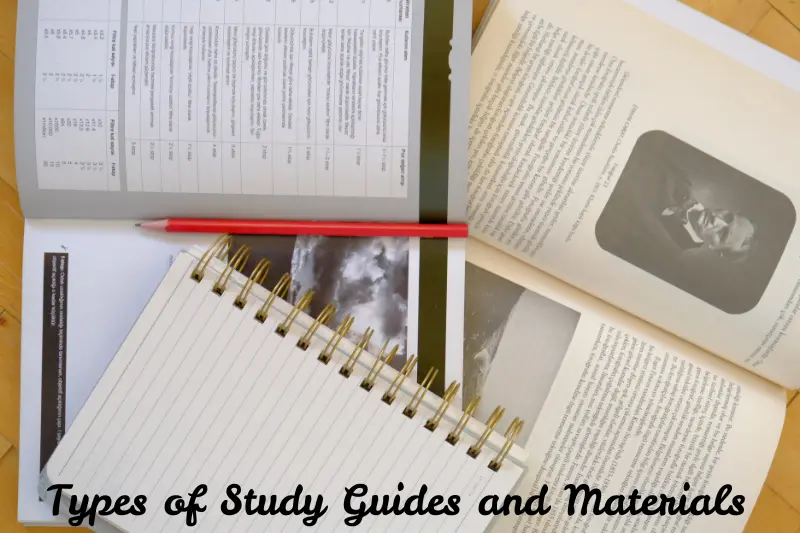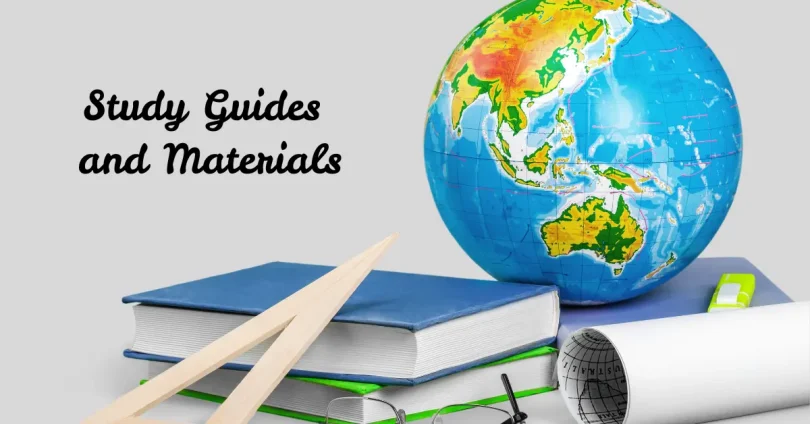Effective study requires more than just reading textbooks and attending lectures. The right study guides and materials can dramatically improve your understanding of a subject, enhance memory retention, and ultimately lead to better academic performance.
This detailed guide explores the different types of study guides and materials, how to use them effectively, and strategies to maximize your learning.
What Are Study Guides and Materials?

Study guides and materials are structured resources designed to assist students in learning, reviewing, and retaining information. A study guide typically breaks down complex topics into smaller, digestible sections, highlighting essential concepts, terms, formulas, and key points.
Study materials are the resources—whether physical or digital—that help you engage with the study guide content and reinforce your learning.
Why Are Study Guides and Materials Important?
- Time Efficiency: Rather than reading entire chapters or sections of textbooks, study guides and materials condense the material to focus on the most important concepts. This saves time and ensures that you’re covering the necessary topics effectively.
- Active Learning: Tools like practice tests, flashcards, and quizzes encourage active recall, a technique proven to boost memory retention. Active learning helps reinforce concepts in your brain, making them easier to recall later.
- Targeted Review: If you struggle with a particular concept, study guides and materials allow you to focus your efforts on areas that need improvement, rather than revisiting content you already know well.
- Flexibility: With both traditional and digital formats available, study guides and materials offer flexibility. They can be used in various settings, whether you’re studying at home, in a library, or even on the go.
Types of Study Guides and Materials

There’s a wide variety of study guides and materials available for different subjects and learning preferences. Below is a detailed look at the most common types.
1. Textbooks
Textbooks are often the primary study material for many courses. They provide comprehensive coverage of subjects and can include practice exercises, case studies, examples, and detailed explanations. Textbooks are typically aligned with a course syllabus, ensuring that they contain the necessary material for that course.
- Pros: In-depth coverage, authoritative content, structured layout.
- Cons: Can be dense, require significant time to go through, and sometimes hard to digest for complex topics.
2. Notes
Whether handwritten during class or typed from a textbook, notes are essential for summarizing key points. They capture the most important ideas from lectures, readings, and discussions.
- Handwritten Notes: Writing by hand has been shown to improve memory retention, as it forces you to rephrase and process the information.
- Digital Notes: Tools like Evernote, OneNote, or Google Keep make organizing, searching, and revising easier. They can also be synced across multiple devices for convenient access.
Study Tip: Review your notes soon after taking them to reinforce your memory and clarify any confusing concepts.
3. Flashcards
Flashcards are one of the most popular tools for active recall, a technique where you actively test yourself on the material instead of passively reviewing it. Flashcards can be used to memorize definitions, dates, formulas, vocabulary, and concepts.
- Digital Flashcards: Tools like Quizlet, Anki, and Brainscape offer pre-made flashcards or allow you to create your own. Many platforms use spaced repetition algorithms to help you review concepts at optimal intervals for maximum retention.
Study Tip: Create your own flashcards rather than relying solely on pre-made ones. The process of creating flashcards helps reinforce the material in your mind.
4. Online Study Guides and Websites
With the advent of the internet, online resources have become increasingly popular. Websites, apps, and educational platforms offer a wide range of study guides and materials to supplement your learning.
- Khan Academy provides free video lessons and exercises in subjects ranging from math to history.
- Coursera and edX offer online courses from top universities around the world, often including study guides and practice tests.
- Quizlet and Brainscape offer interactive flashcards, while Chegg provides textbook solutions and study guides for a variety of subjects.
Study Tip: Use websites that offer interactive quizzes and exercises to actively engage with the material and track your progress.
5. Practice Tests and Mock Exams
One of the best ways to prepare for exams is by taking practice tests. These tests simulate the real exam experience and give you a sense of what to expect in terms of format, question difficulty, and timing. Many platforms offer practice exams for standardized tests (like the SAT, GRE, or MCAT), as well as subject-specific mock exams.
- Pros: Helps with time management, reduces test anxiety, and identifies areas that need improvement.
- Cons: Some mock exams may not fully represent the actual test content.
Study Tip: Take practice tests under timed conditions to simulate the actual exam experience. Review your mistakes thoroughly to ensure you understand why you got them wrong.
6. Study Apps
Mobile apps are increasingly popular as study materials because they allow for on-the-go learning. These apps can help you stay organized, create flashcards, and even track your study habits.
- Forest: An app that helps you stay focused and avoid distractions by turning studying into a game where you grow a tree while you study.
- StudyBlue: A mobile platform that lets you create flashcards, notes, and study guides. It also allows you to share them with others.
- Google Keep & Microsoft To-Do: Useful for organizing your study tasks and tracking your progress.
Study Tip: Use apps that encourage focused studying and minimize distractions, such as Forest.
You may also like to read these posts:
Best 21 Free Online Libraries For Book Lovers And Students
The Best Book Recommendations For All Reading Tastes
10 TOP Non-Fiction Books: Must-Reads For Personal Growth
Best Free Learning Resources For Self-Learning
Strategies for Using Study Guides and Materials Effectively
Having the right study guides and materials is only half the battle; the key to success lies in using them effectively. Here are some strategies to maximize your study time.
1. Create a Study Plan
A well-organized study schedule will help you stay on track. Break your study material into manageable sections and allocate specific time slots for each topic. Prioritize difficult or unfamiliar material, and set clear goals for each study session.
- Tip: Include time for breaks and revision in your study plan to avoid burnout.
2. Use Active Recall and Spaced Repetition
Active recall and spaced repetition are two of the most effective memory techniques. Use study guides and materials to test yourself regularly, and implement spaced repetition by reviewing material at increasing intervals (e.g., after one day, one week, and one month).
- Tip: Use digital flashcards with spaced repetition algorithms to automate this process.
3. Combine Study Materials
Different study guides and materials provide different perspectives on the material. For example, use textbooks for in-depth understanding, online guides for summarization, and flashcards for quick recall. Combining various resources can deepen your understanding and help you retain the information better.
4. Teach What You’ve Learned
Teaching someone else is an excellent way to solidify your understanding. Whether it’s explaining concepts to a friend or even just talking out loud to yourself, teaching forces you to organize your thoughts and clarify any gaps in your knowledge.
5. Stay Consistent and Avoid Cramming
Consistency is key to effective studying. Instead of cramming all the material the night before the exam, try to spread out your study sessions over several weeks or months. This will help you retain information more effectively and reduce stress.
Final Thoughts on Study Guides and Materials
The right study guides and materials are essential tools for academic success. They provide structured, efficient ways to learn and review content, enabling you to master complex subjects. By selecting the appropriate study guides and materials and applying effective study strategies, you can maximize your learning potential and perform better in exams.
Remember, consistency, active learning, and using a variety of resources will ensure that you’re well-prepared for any challenge. Good luck with your studies, and happy learning!
FAQs
1. What are study guides and materials?
2. How do study guides help with learning?
3. What types of study guides and materials are available?
Notes (handwritten or digital) to summarize key points.
Flashcards for active recall.
Online resources like videos and quizzes.
Practice tests for exam simulation.
Study apps for on-the-go learning.








